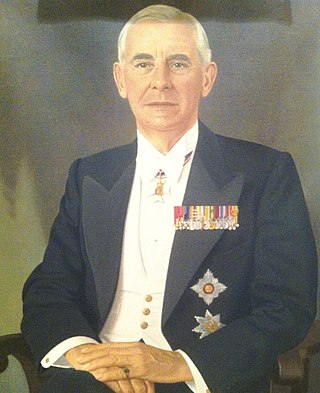
The British South Africa Company was chartered in 1889 following the amalgamation of Cecil Rhodes' Central Search Association and the London-based Exploring Company Ltd, which had originally competed to capitalize on the expected mineral wealth of Mashonaland but united because of common economic interests and to secure British government backing. The company received a Royal Charter modelled on that of the British East India Company. Its first directors included The 2nd Duke of Abercorn, Rhodes himself, and the South African financier Alfred Beit. Rhodes hoped BSAC would promote colonisation and economic exploitation across much of south-central Africa, as part of the "Scramble for Africa". However, his main focus was south of the Zambezi, in Mashonaland and the coastal areas to its east, from which he believed the Portuguese could be removed by payment or force, and in the Transvaal, which he hoped would return to British control.

The Pioneer Column was a force raised by Cecil Rhodes and his British South Africa Company in 1890 and used in his efforts to annex the territory of Mashonaland, later part of Zimbabwe.

Sir Charles Patrick John Coghlan,, was a lawyer and politician who served as Premier of Southern Rhodesia from 1 October 1923 to his death. Having led the responsible government movement in the territory during the latter days of Company rule, he was Southern Rhodesia's first head of government after it became a self-governing colony within the British Empire.

The Zimbabwe national rugby union team, nicknamed the Sables, represents the Zimbabwe Rugby Union in international competition. While sides representing the colony of Rhodesia have played as early as 1910, the modern day Zimbabwe rugby team did not play its first test until 1981, against Kenya. Zimbabwe has competed in two World Cups, in 1987 and 1991, in place of South Africa, who were sanctioned by the IRB at the time due to apartheid. Zimbabwe is categorized as Tier 3 Development One, which prioritizes Zimbabwe over other nations due to historical success as well as popularity of rugby in the nation.

The Zimbabwe Stock Exchange, or ZSE, is the official stock exchange of Zimbabwe. Its history dates back to 1896 but has only been open to foreign investment since 1993. The exchange has about a dozen members, and currently lists 63 equities. There are two primary indices, the ZSE All Share and the ZSE Top 10.

The First Matabele War was fought between 1893 and 1894 in modern-day Zimbabwe. It pitted the British South Africa Company against the Ndebele (Matabele) Kingdom. Lobengula, king of the Ndebele, had tried to avoid outright war with the company's pioneers because he and his advisors were mindful of the destructive power of European-produced weapons on traditional Matabele impis attacking in massed ranks. Lobengula reportedly could muster 80,000 spearmen and 20,000 riflemen, armed with Martini-Henry rifles, which were modern arms at that time. However, poor training may have resulted in the weapons not being used effectively.

The Second Matabele War, also known as the First Chimurenga, was fought in 1896 and 1897 in the region later known as Southern Rhodesia, now modern-day Zimbabwe. It pitted the British South Africa Company against the Matabele people, which led to conflict with the Shona people in the rest of Southern Rhodesia.
Edinburgh Wanderers is a former rugby union club, founded in 1868. It was latterly a tenant of the Scottish Rugby Union, playing home fixtures at Murrayfield Stadium for nearly 75 years. In 1997 it merged with Murrayfield RFC to form Murrayfield Wanderers.

John Wallace Downie served as High Commissioner of Southern Rhodesia from 1930 to 1935.
Leonard Ray Morgan (1894–1967) was the first permanent Secretary for Education in the Federation of Rhodesia and Nyasaland.
Captain Lewis Robertson was a Scottish rugby union player. He played for London Scottish FC and was capped nine times for Scotland between 1908 and 1913. He also played for the Army from 1904 to 1914, and several other clubs.

Sir Andrew Balfour was a Scottish Medical Officer who specialised in tropical medicine. Balfour spent twelve years in Khartoum, Sudan and was the Medical Officer of Health in the city. As well as writing medical publications, Balfour also wrote historical fiction and fantasy novels, the majority of which were published from 1897 to 1903. In his youth Balfour was also a notable sportsman playing rugby union for Cambridge University in the Varsity Match and was selected to represent the Scotland national team.

Sir Ernest Lucas Guest was a Rhodesian politician, lawyer and soldier. He held senior ministerial positions in the government, most notably as Minister for Air during the Second World War.

The Shangani Patrol was a 34-soldier unit of the British South Africa Company that in 1893 was ambushed and annihilated by more than 3,000 Matabele warriors in pre-Southern Rhodesia, during the First Matabele War. Headed by Major Allan Wilson, the patrol was attacked just north of the Shangani River in Matabeleland, Rhodesia. Its dramatic last stand, sometimes called "Wilson's Last Stand", achieved a prominent place in the British public imagination and, subsequently, in Rhodesian history, similarly to events such as the Battle of the Little Bighorn and the Battle of the Alamo in the United States.

The British South Africa Company's administration of what became Rhodesia was chartered in 1889 by Queen Victoria of the United Kingdom, and began with the Pioneer Column's march north-east to Mashonaland in 1890. Empowered by its charter to acquire, govern and develop the area north of the Transvaal in southern Africa, the Company, headed by Cecil Rhodes, raised its own armed forces and carved out a huge bloc of territory through treaties, concessions and occasional military action, most prominently overcoming the Matabele army in the First and Second Matabele Wars of the 1890s. By the turn of the century, Rhodes's Company held a vast, land-locked country, bisected by the Zambezi river. It officially named this land Rhodesia in 1895, and ran it until the early 1920s.
Thomas Meikle, born in Scotland, was a businessman and pioneer in Southern Rhodesia, the African country now known as Zimbabwe.
Mother Patrick Mary Anne Cosgrave was an Irish Dominican nun, pioneer nurse in Rhodesia, educationist, and prioress.
Thomas Begbie (1862-1896) was a Scotland international rugby union player. His regular playing position was Fullback.

Hilderston or Hilderstone in West Lothian, Scotland, was the site of the discovery of a vein of silver in 1606 and a mining operation that attracted international interest. King James used rumours of a silver bonanza to leverage a loan in the City of London. He took over the mine works, an act sometimes regarded as an example of nationalization. The enterprise may have inspired a satirical stage play. On 8 May 1608 work commenced under royal supervision. Miners from Cornwall and Germany were employed in the works.
Daphne Merna Wilson, who wrote as Merna Wilson, was a Zimbabwean journalist, poet and novelist. She became active as a writer in pre-independence Rhodesia.













